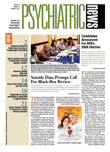This letter is in response to the Viewpoints column in the July 20 issue titled “The Myth of Abortion Trauma Syndrome” by APA President-elect Nada Stotland, M.D. Dr. Stotland wrote that “the assertions of psychological damage, made by legislatures and the [U.S] Supreme Court, are contrary to the scientific evidence.... 'Abortion trauma syndrome' and 'post-abortion psychosis' are inventions disguised to mimic those diagnoses, and they demean that careful process” of crafting the titles and definitions of psychiatric diagnoses.
On the July 20 PBS show “NOW” hosted by David Brancaccio, there was a discussion on the cases of 2,000 women who had certified before a notary public that they had suffered repercussions following their abortions. Among the symptoms they noted were extreme emotional states, tears, guilt, remorse, and depression. At least several suicidal attempts had taken place in this group of 2,000. To assert that abortion does not cause significant, negative psychiatric repercussions in some women, as did Dr. Stotland, who also appeared on this program, boggled my mind. She implied that any negative psychological repercussions following their abortion were due to past problems in their lives and not due to the abortion.
In my experience in 45 years of psychiatric practice, most of my patients had some genetic, cultural, environmental, and personality factors in their background that played a part in their reactions to stress. Abortion can be a difficult and painful decision. To suggest that the responses women portrayed on “NOW” weren't related to their abortion is to deny a likely cause-and-effect relationship. Why isn't it possible that some women are vulnerable to developing an “abortion trauma syndrome”?
Denial can be a very useful and powerful defense mechanism. It permits us to cope and move forward (or backward). I presume that the majority of women who choose abortion are able to move forward and cope. I surmise that there are some others who experience guilt, remorse, ambivalence, or feelings of loss then or later regarding their abortion.
Years ago, I treated a woman who was pregnant and wanted to keep her baby; she ultimately complied with the wishes of others to terminate the pregnancy. If psychiatric symptoms develop following this decision, isn't it reasonable to consider the possibility of a diagnostic category such as“ post-abortion trauma”? I wonder what some of your other readers think.
Response from APA President-elect Nada Stotland, M.D., an expert in reproductive psychiatry:
Dr. Weisner raises important questions. There are women who experience sadness and regret after abortions. What there isn't is evidence of a significant causal relationship between abortion and psychiatric illness, or a“ post-abortion” syndrome. Feelings are not psychiatric illnesses.
The program cited, which can be accessed online at<www.pbs.org/now/shows/329/index.html>, shows women actively recruited into religious anti-abortion groups in which abortions that took place years earlier are blamed for a whole range of psychiatric symptoms without consideration of the participants' mental health before the abortions, the circumstances that led to it, or events in the intervening years.
These women are then expected to provide notarized statements attesting to the mental health problems they attribute to their abortions. The program clearly demonstrated that the assertion that abortion causes mental illness is now the central strategy of the anti-abortion movement.
Postpartum psychiatric illness was recognized by Hippocrates.“ Post-abortion depression” or “post-abortion syndrome” was recently invented, for political purposes. That is why APA is opposed to the use of those terms and that is why it is important for psychiatrists to be informed about psychiatric aspects of abortion.
The scientific literature indicates that the best predictor of a patient's mental health after an abortion is her mental health before the abortion. Women have abortions because they are in difficult circumstances: overwhelming responsibilities without adequate resources, pregnancy resulting from rape or incest, abandonment by their partners, and mental illness.
Still, the incidence of mental illness after delivery of a baby—the only alternative to abortion for a pregnant woman—is considerably higher than that after abortion. Having an abortion under duress, like Dr. Weisner's patient, is both an indication of serious life stress and a risk factor for a negative outcome. Clinicians should obtain full reproductive histories from patients and help them, nonjudgmentally, to address any unresolved feelings they have about any reproductive event, while recognizing that feelings about any life decision or event change as a patient's circumstances change over time.
Suggestions for new psychiatric diagnoses can be submitted to the DSM-V Steering Committee, already hard at work doing the careful research that will drive decisions about our psychiatric nosology.
As I said in my Psychiatric News column, religious or moral objections to abortion deserve our full respect; inventing psychiatric illnesses for political purposes does not. ▪
